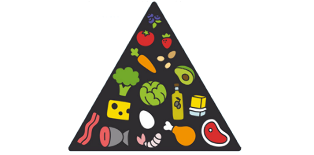“The keto diet burns fat, but retains very good calories, allowing you to maintain good muscle mass and metabolic rate. More and more people are opting for the keto diet. These are not only nutritional principles, this is also a biological tool ”- these words can be read today on the social media of those following the keto diet. Is it really? Look at this question objectively and weigh the pros and cons
The essence of the ketogenic diet is to get rid of as much carbohydrates as possible (and this is not just baked goods, pasta, sugar and its substitutes, but also honey, fruit, and vegetables. , cereals and rice of any kind). The diet allows quota of 5% carbohydrates due to berries, herbs and some vegetables.
For comparison: in the standard food pyramid, prescribed by the World Health Organization as the basis of a balanced diet, the carbohydrate percentage can be as high as 60%.
As you know, practicing a protein diet is not safe, but where do you get your energy? The answer is fat. You shouldn't be afraid of them; The horrors of cholesterol, which frightened people throughout the twentieth century, in the twenty-first century were seen as a conspiracy by interested pharmaceutical companies. It's important to correct it: we're talking about healthy fats, rich in polyunsaturated fatty acids, not about juicy steaks, margarine and trans fats, which are bad for your health.
WHAT IS KETOSIS? HOW DOES KETO DIET WORK?
The principles of the diet
The body uses carbohydrates as the brain's primary fuel. With a sharp decrease in carbohydrates in the diet of less than 20 grams per day, glucose levels are severely reduced - and there is not enough energy for normal functioning and fat oxidation. To nourish the brain, the body begins the process of acquiring alternative energy - ketosis. This is a condition that develops due to the carbohydrate starvation of cells, when the body begins to break down fat for energy to form a large number of ketones. In the normal state, the concentration of ketones in the blood is very low, because they are replaced by glucose and the body does not need any additional energy. During ketosis, the concentration of ketone bodies increases sharply.
Ketosis can also be achieved by fasting for a few days, but this is extremely harmful. The keto diet is an alternative to complete fasting that may cause less harm to the body. Along with nutrition, we continue to get all the nutrients we need and don't feel hungry, just eliminate carbohydrates and force the body to begin the fat breakdown process.
The keto diet has a pretty solid scientific foundation; She showed excellent results in children and adults with epilepsy - until seizure syndrome disappeared against the background of anticonvulsant discontinuation. It is effective for people with certain autoimmune diseases and Alzheimer's disease, as well as for people with cancer. The fact is that tumor cells "eat" glucose, and according to studies, switching to a low-carbohydrate but high-fat diet leads to the deterioration of the tumor process.
Observing patients who adhere to this nutritional model shows that, strangely enough, one begins to feel energized, brain activity increases and mood improves. The secret lies in biochemical processes: the body switches to a new source of energy - ketones, which are formed during the breakdown of fats.
The ones who first popularized the keto diet were bioreactors who wanted to stay healthy and active until old age.
Hollywood stars joined them, and then the keto diet craze spread around the world. Getting rid of excess fat by consuming fat can simply be done.
However, only an experienced nutritionist should recommend a keto diet. Not a diet consultant, not an Insta food blogger, not a nutritionist or keto expert. There are a number of contraindications to this food system, for example, diabetes, chronic pancreatitis, cholecystitis, familial hyperlipidemia, etc. v. In addition, when the diet begins, when switching to other energy sources, the body often has a complex adaptation.
KETO DIET PYRAMID FOODS

The main downside of the keto diet:
- This is an unbalanced diet. When you completely eliminate carbohydrates, you lose a large amount of nutrients to your body.
- May cause constipation. For the organs of the digestive tract, such a diet is not at all helpful.
- There may be an odor of acetone from the body, urine and mouth. To minimize bad odors, drink more than 2 liters of water a day to get rid of more acetone.
- All carbohydrates are eliminated, such a normally inactive process will be artificially activated, the load on the liver increases. This is quite unhealthy.
The main benefits of the Keto Diet:
- Lose weight quickly. Excluding carbohydrates from the diet does not allow the body to use the same substances as usual: to store fat "for storage", and to use carbohydrates as primary energy.
- No constant hunger like other diets. This means that there is no spike in blood sugar (ketones act as glucose).
- High in calories will make you full and help avoid stagnation.
- Fat is burned in the body, and muscle mass is preserved.
Contraindicated for this type of diet:
- is pregnant;
- people with gastrointestinal diseases;
- people with type 1 and 2 diabetes;
- people with endocrine diseases;
- breastfeeding
Is it really possible to lose weight with the keto diet?
The keto diet promotes weight loss, provides energy and allows a person to stay full for longer. The secret to increasing satiety and energy levels is that the majority of calories come from fat, which are very nutritious and slow to digest. As a result, keto dieters consume fewer calories because they don't stay hungry longer. They no longer need to eat a lot or as often.

Its main goal is to continuously maintain a person in a natural state of ketosis. It usually takes about four to eight weeks to fully adjust to the keto. After this time, the level of glycogen (glucose stored in the muscle and liver) will decrease, the excess water will be excreted from the body, the muscle strength will increase and the patient will feel energized. . When you first start eating low-carb foods on your ketogenic diet, you will need to keep track of your ketosis. This way, you'll know exactly what you're doing right and what's wrong, and if you need to make any changes to your diet. The simplest test is a ketone breath test. After a few days, you should feel a fruity, slightly sour or even metallic taste in your mouth. What is the reason? While in ketosis, your body synthesizes ketone bodies: acetone, acetoacetate and beta-hydroxybutyrate. Acetone is excreted in the urine and via the respiratory tract, this is the reason why "ketone respiration" occurs. Usually, bad taste and breath will decrease after a few weeks.
Side effects of diet
A decrease in the percentage of carbohydrates leads to a decrease in insulin levels in the blood, resulting in the kidneys receiving a signal to release excess sodium. Between reducing sodium and releasing excess sodium, the body releases more baking soda than usual, and as a result, sodium and other electrolytes drop. When this happens, you may feel tired, headache, cough, runny nose, irritability, and nausea. This condition is called a ketoplash. It's important to understand that it is not caused by a flu virus. Such a cold is not dangerous and is not contagious. The name in this case only reflects the similarity of the symptoms. When signs of discomfort appear, many people fear, think that the keto diet has negatively affected their health, and start eating carbohydrates again. In fact, the cold keto is a sign that your body is finally getting rid of sugars, carbs and industrial foods and is rebuilding itself to use fat as an energy source. Usually it only lasts a few days, which is the time it takes to adapt. You can alleviate the condition by including more sodium and electrolytes in your diet, drinking more water.
In all cases, before dieting, you should consult a doctor and during this time it is necessary to monitor the condition of the disease: blood chemistry, blood pressure, the state of the cardiovascular system andorgans in the digestive tract.
It is important to emphasize the main thing: each person is different - unique body structure, genetic makeup, stress factors, level of physical activity and eating habits have a big effect. great to health.
So the ketogenic diet is a low-fat, low-carb meal plan designed to put the body in a state called "ketosis" and burn off stored fat. Designed for children with epilepsy, the celebrity keto diet has exploded in popularity in recent years.
However, a year ago, most of the media questioned the benefits and even the safety of this method of weight correction. The ketogenic diet is not a weight loss magic wand. Avoiding carbohydrates leads to an unbalanced diet (depriving yourself of essential nutrients), headaches, weakness and chills. And the keto diet can also cause a state of lipotoxic toxins, and as a result cause hepatitis, gallbladder and stomach attack. In the long term, it can increase the risk of atherosclerosis and insulin-induced stroke.
Listen to and study your body. And then, you can, if you want, quickly lose that extra weight by choosing the weight management method that's best for you.
































































